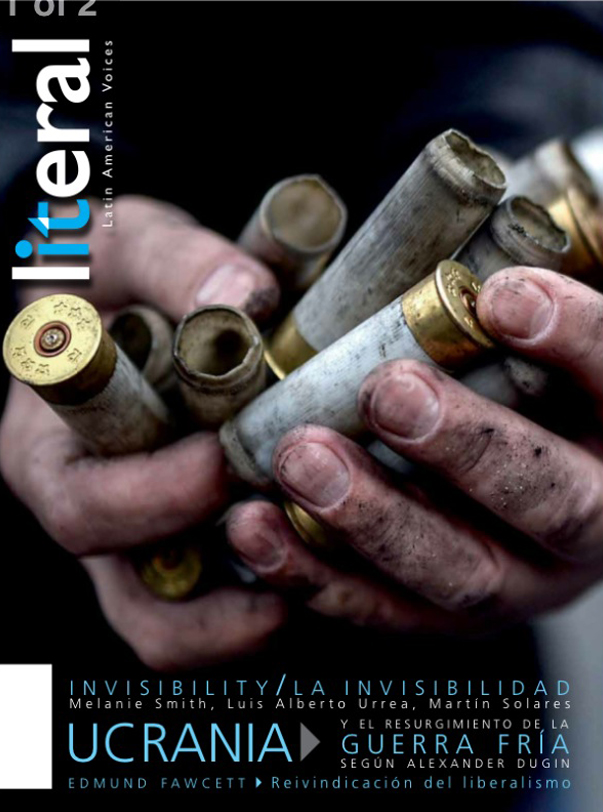Literal 37
Invisibility / La invisibilidad
The consecutive crises of the past few years would seem to refute the post-Cold War expansion of democracy as an undisputable model of social organization and economic development. According to Alexander Dugin–described by some as Putin’s ideologue–the liberal West finds itself in a stage of implosion, where only another war can save it. As he writes in the essay that opens this issue of Literal, the occupation of Crimea and subsequent conflict between Russia and world powers led by the United States have given liberalism the enemy it was waiting for. Today, as in the past, Russia represents the ultimate anti-liberal, anti-Western foe. To speak of a crisis in liberalism is already a cliché. But as Edmund Fawcett reminds us, liberalism never really presented itself as a definitive solution; on the contrary, it has always been a perfectible social and economic model and, therefore,one that continually reinvents itself depending on the time and place. Recent financial bankruptcies and the appalling inequalities they generate are not the origin of this crisis, but rather part of the problem–and perhaps not even the most important part, at that. Liberalism, as Fawcett states in these pages, urgently requires a reconfiguration capable of restoring its capacity for adaptation. This edition, dedicated to the concept of invisibility, also features a text by Pulitzer Prize nominee Luis Alberto Urrea regarding the unseen labor force of migrants that sustains the U.S. economy.
Under the same umbrella, we have also included an essay by novelist Martín Solares exploring the theme of drug trafficking, literature and the disappearance of the Mexican State, plus a dossier of mini-fiction on a variety of things unseen. Finally, artist Melanie Smith reveals in an interview the ways in which her current work explores the absent body. All this, in addition to a selection of poetry by Adolfo Castañón, Mercedes Roffé, Craig Arnold and Gérard Manset, as well as our insights regarding the visual expressions of Miguel Ángel Ríos and Susannah Mira.
Las sucesivas crisis de los últimos años parecen desmentir la idea de una expansión de la democracia como modelo de organización social y desarrollo económico inobjetable tras el fin de la Guerra Fría. Para Alexander Dugin –principal ideólogo de Putin en opinión de algunos– el Occidente liberal se halla en una etapa de implosión en donde sólo una guerra podría salvarlo. Según escribe en esta edición de Literal, la ocupación de Crimea y el posterior conflicto entre Rusia y las potencias encabezadas por Estados Unidos, le conceden al liberalismo ese enemigo que estaba esperando. Hoy como ayer, Rusia representa al adversario antiliberal y antioccidental por antonomasia. Hablar de una crisis del liberalismo ya es un lugar común. Sin embargo, nos recuerda Edmund Fawcett, el liberalismo jamás se ha erigido como una solución definitiva; al contrario, se trata de un modelo social y económico siempre perfectible y, en esa medida, en permanente adaptación según las épocas y lugares. Las bancarrotas financieras recientes y las ofensivas desigualdades que generan no son el origen de esta crisis sino sólo una parte del problema –y quizá no la más importante. El liberalismo, dice Fawcett en nuestras páginas, necesita una reconfiguración que le devuelva su original capacidad de adaptación.
Esta edición, dedicada en parte al concepto de invisibilidad, cuenta también con un texto del
candidato al Premio Pulitzer Luis Alberto Urrea sobre la fuerza laboral de los migrantes, invisibles pero que sostienen la economía de Estados Unidos. Bajo el mismo paraguas, incluimos un ensayo del novelista Martín Solares sobre el narcotráfico, la literatura y la desaparición del Estado mexicano,además de un dossier con mini-ficciones en torno a la multiplicidad de lo invisible. Asimismo, la artista Melanie Smith explica en entrevista su exploración sobre la temática del cuerpo ausente.
Cierran nuestro número una selección de poemas de Adolfo Castañón, Mercedes Roffé, Craig
Arnold y Gérard Manset, junto con las expresiones visuales de Miguel Ángel Ríos y Susannah Mira.


